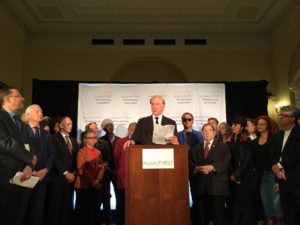Two weeks ago I participated in a Lobby Day of Action on Capitol Hill for H.R. 1733, the “Fair Play Fair Pay Act.” The day started off with a press conference featuring passionate speeches by noteworthy musicians T Bone Burnett, Rosanne Cash, and Duke Fakir of the Four Tops. Others present- country songwriter Rodney Crowell, vocalist Nona Hendryx, and rapper MURS-represented the wide spectrum of support for the bill, which seeks to rectify what many see as a major injustice in music royalty collection in America.

As the studio manager of Airshow’s Takoma Park facility, a member of the DC Chapter of the Recording Academy, and a musician myself, I see first hand the work, dedication, and passion that musicians pour into their creative works. And it’s not only them, backing vocalists often give the same amount of dedication to a record, artist managers have to use artist management software and other resources around the clock to make sure the talent they’re representing continues to grow, record labels promote musicians so more people can hear their singles, the list goes on. Yet, one of the most popular ways that music is heard around the world – AM/FM or terrestrial radio – does not value performers. Currently, songwriters and their publishers get royalty payouts when their works are played over the radio airwaves, but performers themselves do not. The U.S. stands practically alone in the industrialized world in this regard: other countries that refuse to pay a performance royalty include China, North Korea and Iran.
Losses are reciprocal
In other nations which do collect on behalf of performers, American artists are not paid- until new legislation is passed and a reciprocal agreement is worked out where all performers, regardless of what country they live in, receive the performance rights to which they are entitled. According to the musicFIRST Coalition, national music industry advocates who have been fighting for performance rights since 2007 and the primary entity behind the lobby day, the lack of reciprocity costs the U.S. approximately $100 million annually in lost revenue. In a music economy that is rapidly shifting (and one where sales of physical recordings have drastically fallen), the lack of a performance right means countless musicians are denied fair compensation for the commercial use of their work.
Bipartisan support

The mood on the Hill indicated that the tide might be turning. A truly bipartisan bill, the “Fair Play Fair Pay Act” was introduced by Democratic representative Jerrold Nadler (NY) and Republican Marsha Blackburn (TN) and the list of other prominent co-sponsors has been steadily growing. I spent the day speaking to lawmakers with a group of accomplished musicians: Toby Pipes of Deep Blue Something; veteran horn player Tom “Bones” Malone of the Saturday Night Live band, CBS Orchestra, and Frank Zappa; San Francisco-based producer and remixer Count; Alec Ounsworth of indie act Clap Your Hands Say Yeah; and DC-based musician and Bad Friend record label owner Ryan Little. Our discussions touched on several key themes:
- In today’s music economy, innovation in digital music technology delivers music to listeners in nearly effortless ways that often obscure the talent it really takes to play great music and make great recordings. The contributions to some of our most treasured examples of American music – whether made by the front people, session musicians or background singers – are often overlooked.
- As musicFIRST, the Future of Music Coalition and others like legal scholar Jeffrey Toobin in a recent New Yorker opinion arguing for Fair Play Fair Pay mention, the rise of Internet and satellite radio (which do pay performance rights in most cases) have complicated the marketplace and created uneven systems of compensation that give unfair economic advantage to larger commercial radio stations.
- Passage of the Fair Play Fair Pay Act would solve some of the more blatant problems that arise from outdated legislation as a necessary first step, and other irregularities that have plagued similar debates about compensation couldfinally be addressed.
Fair Play Fair Pay is one response to the complex issue of how to create equitable arrangements across all facets of the music industry to allow performers to share in the benefits of the otherwise amazing potential of our contemporary music-listening environment.
For more information about the Fair Play Fair Act and how you can lend your own support, the Future of Music Coalition has a valuable analysis; musicFIRST is leading the charge in advocating passage of the bill.
